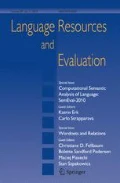Abstract
Partial cognates are pairs of words in two languages that have the same meaning in some, but not all contexts. Detecting the actual meaning of a partial cognate in context can be useful for Machine Translation tools and for Computer-Assisted Language Learning tools. We propose a supervised and a semi-supervised method to disambiguate partial cognates between two languages: French and English. The methods use only automatically-labeled data; therefore they can be applied to other pairs of languages as well. The aim of our work is to automatically detect the meaning of a French partial cognate word in a specific context.
Notes
The MDC corpus was provided by Prof. Raphael Salkie, Brighton University, UK.
References
Brew, C., & McKelvie, D. (1996). Word-pair extraction for lexicography. In Proceedings of 2nd International Conference on New Methods in Language Processing (pp. 45–55). Ankara, Turkey.
Carroll, S. (1992). On cognates. Technical report, Second Language Research.
Diab, M., & Resnik, P. (2001). An unsupervised method for word sense tagging using parallel corpora.In Proceedings of the 40th Annual Meeting on Association for Computational Linguistics (pp. 255–262). Philadelphia, Pennsylvania.
Hearst, M. (1991). Noun homograph disambiguation using local context in large corpora. In Proceedings of the 7th Annual Conference of the University of Waterloo Centre for the New Oxford English Dictionary (pp. 1–22). Oxford, UK.
Heuven, W. V., Dijkstra, A., & Grainger, J. (1998). Orthographic neighborhood effects in bilingual word recognition. Journal of Memory and Language, 39, 458–483.
Inkpen, D., Frunza, O., & Kondrak, G. (2005). Automatic identification of cognates and false friends in French and English. In RANLP-2005 (pp. 251–257). Bulgaria.
Kondrak, G. (2001). Identifying cognates by phonetic and semantic similarity. In Proceedings of NAACL 2001: 2nd Meeting of the North American Chapter of the Association for Computational Linguistics, pp. 103–110.
LeBlanc, R., & Séguin, H. (1996). Les congénères homographes et parographes anglais-français. Twenty-Five Years of Second Language Teaching at the University of Ottawa.
Li, H., & Li, C. (2004). Word translation disambiguation using bilingual bootstraping. Computational Linguistics, 30(1), 1–22.
Simard, M., Foster, G. F., & Isabelle, P. (1992). Using cognates to align sentences in bilingual corpora. In Proceedings of the 4th International Conference on Theoretical and Methodological Issues in Machine Translation (pp. 67–81). Montreal, Canada.
Yarowsky, D. (1995). Unsupervised word sense disambiguation rivaling supervised methods. In Proceedings of the 33rd Annual Meeting of the Association for Computational Linguistics, pp. 189–196.
Author information
Authors and Affiliations
Corresponding author
Rights and permissions
About this article
Cite this article
Frunza, O., Inkpen, D. Disambiguation of partial cognates. Lang Resources & Evaluation 42, 325–333 (2008). https://doi.org/10.1007/s10579-008-9072-x
Received:
Accepted:
Published:
Issue Date:
DOI: https://doi.org/10.1007/s10579-008-9072-x

